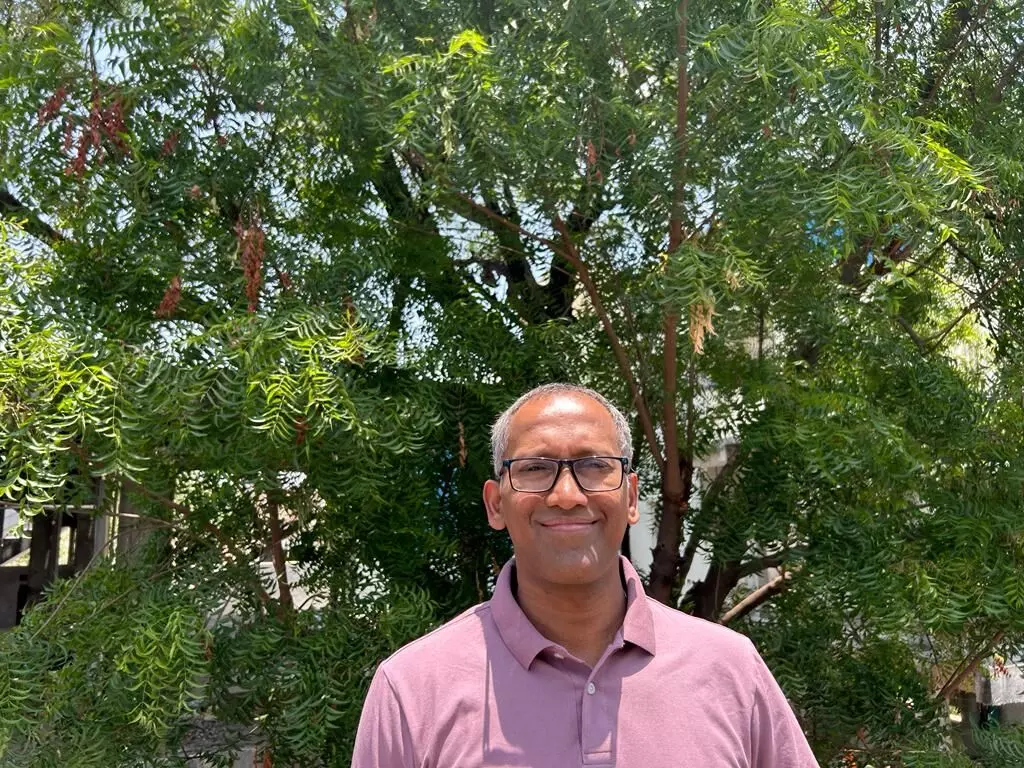Reading over academics: Meet Raghuram Ananthoj the man behind Read India Celebration
The objective of RIC is to create awareness about the importance of non-academic reading, encourage problem-solving and leadership skills among students
By Nikisha Uddagiri
Hyderabad: A former Ranji cricketer and successful consultant, Raghuram Ananthoj, has taken it upon himself to spread awareness about the importance of non-academic reading among students in India through Read India Celebration (RIC). Through his leadership workshops and nationwide reading movement, Raghuram has been able to encourage students to explore the benefits of practical reading and problem-solving skills.
The objective of RIC is to create awareness about the importance of non-academic reading, encourage problem-solving and leadership skills among students and citizens, and ultimately connect one billion people through reading by 2025.
Speaking to NewsMeter, Raghuram says, “A decade ago, we started an initiative to encourage non-academic reading among students, which has now expanded to an online platform with participants from over 20 Indian states. The programme requires students to read a non-academic book or story and submit a document summarising their learnings and a creative solution to a real-world problem. This programme engages students in problem-solving and has received positive feedback from parents and students.”
He further says, “I started with leadership sessions focusing on human potential and realised that many people don’t know their strengths. So, I experimented with a nationwide reading movement, aiming to spread awareness about the importance of non-academic reading.”
The reading movement gained momentum after CBSE issued a circular and over 30,000 students registered for it in 2021. The Chief Minister of Goa launched it as a state festival and Raghuram is currently in talks with other governments to implement it in their states as well. According to Raghuram, if we can make students understand the importance of non-academic reading and tell them what’s in it for them, they will be motivated to read.
Reading key to learning and innovation
Raghuram believes that reading is the key to learning and innovation. He points out that successful people have an open mind and that reading provides a fertile ground for creativity. His reading initiative has been successful in reaching over 1,00,000 students, and he has been able to motivate parents and students alike with the results.
“During my leadership workshops, I discovered that many Indian students only read academic books, unaware that non-academic reading is essential for success. More than 50% of success comes from practical reading and problem-solving skills. All successful people are readers who have an open mind and fertile ground for innovation and creativity. In 2015, we started a reading initiative, in which more than one lakh students participated, and it was very successful. We gave laptops and tablets to the winners, and parents and students were pleased with the results.”
Raghuram emphasises the importance of reading and believes it is the key to learning. He discovered the value of reading after his professional career and has been reading for 10 minutes every day for the last 20-25 years. He returned to India after working in several countries and has been experimenting since then.
“I was a professional cricketer and part of the Hyderabad Ranji Trophy team. I quit sports as I didn’t get the opportunity, and there were no IPL or similar opportunities back then. However, I learned a lot from playing sports, and those experiences helped me in my career working for companies across the world,” says Raghuram, a father of two who encourages his children to prioritise reading and yoga over academics.
He says, “RIC has also been able to instill a love for reading among students, which can have a lasting impact on their academic and personal development. Reading can help students to improve their vocabulary, comprehension, and writing skills, which are important for academic success. It can also help them to develop empathy, imagination, and creativity, which are essential for personal growth.”
What is RIC?
The process to participate in RIC is simple: register, read, and submit. Participants can register on the RIC website and read any non-academic book, story, or article, or research a topic of their choice. Once done with reading, they must submit a document and a video file on the website. The document should provide a summary of the key message from the reading material and suggest an innovative solution for a social problem. The video, on the other hand, should summarise the main takeaways from the reading material.
“Through RIC, students have been able to develop critical thinking, analytical skills, and innovative solutions for real-world problems. The programme has also helped students to improve their communication and presentation skills, as they are required to submit a document and a video summarising their learnings and solutions,” concluded Raghuram.